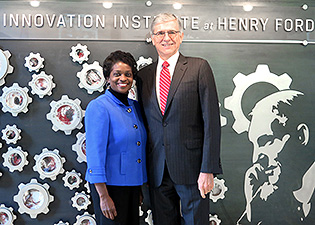
It’s always good to get out of Washington. It’s even better when you get to visit one of America’s great cities. This week, we have had the pleasure of visiting the Motor City: Detroit, Michigan.
In the mid-20th century, Detroit’s economy got a boost from a new network of highways that fueled a spike in auto manufacturing from eight million units in 1950 to a peak of 15 million in the 1970s. Today, new broadband networks are creating even greater opportunities for the people of Detroit, but they are also raising new challenges. The most immediate challenge is that an unacceptable number of Detroit residents are being bypassed by the broadband revolution. Detroit’s digital divide is among the most extreme in the nation. Thirty-eight percent of its residents do not have broadband at home. For low-income households, the percentage offline is a whopping 63 percent.
The costs of digital exclusion are high and are getting higher. In 2015, if you cannot get online, you will not be able to apply for a job at most large businesses. We have reports of students heading to McDonald’s not just to buy a value meal, but to do their homework over the free Wi-Fi network. Offline individuals also do not enjoy the health benefits offered by remote monitoring and other new technologies. One study estimates that broadband helps a typical U.S. consumer save $8,800 a year by providing access to bargains on goods and services, but most low-income residents of Detroit are missing out. The bottom line is this: If you are not connected to the Internet in 2015, you cannot participate fully in our economy and our democracy. This not only hurts the disconnected. Failure to fully optimize the talents of millions of Americans also hurts our nation.
Today, we were honored to meet with local leaders at Detroit’s Henry Ford Innovation Institute to discuss the impact of this digital divide in their community and identify possible solutions.
We spoke about ongoing efforts at the FCC to help close the broadband gaps in cities like Detroit. We discussed the Commission’s modernization of E-rate to support high-speed wired and wireless connectivity in our schools and libraries and the establishment of the Connect America Fund, which will invest $9 billion over six years to expand broadband to nearly 7.5 million rural customers. Looking ahead, we spoke about the need to reboot the Commission’s Lifeline program for the Internet age, which will help connect low-income Americans.
But our main message to the people of Detroit was that the FCC cannot solve this problem on its own. There are multiple barriers to broadband adoption: from cost, to digital literacy to the fact that many Americans do not see the Internet as relevant to their lives. If we ever hope to achieve universal broadband in the United States, we will need a concerted effort from private sector leaders, the public interest community, and government officials at all levels.
Of course, Detroit is also known as Hitsville, U.S.A. and local legend Aretha Franklin nicely summed up the need for collective action, “Without each other, there ain’t nothing people can do.” It is best for us to come to terms about the costs of digital exclusion and work together in order to close these gaps. We are grateful to the people of Detroit who came out today to explore solutions in their community and look forward to engaging with others across the nation to achieve connectivity for all.